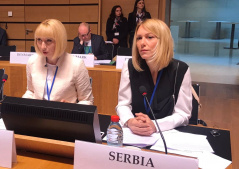National Assembly of the Republic of Serbia / Activities / Activity details

6 July 2019 National Assembly’s standing delegation at the OSCE PA Annual Session
Saturday, 6 July 2019
National Assembly Delegation Takes Active Part in OSCE PA Annual Session
In the course of the OSCE PA Annual Session, on 4 – 8 July, in Luxembourg, the members of the Serbian delegation took active part in meetings of the OSCE PA committees.
Following the meeting of the Standing Committee in which the Resolution Proposal submitted by MP Stefana Miladinovic entitled “Digitalization as an Advantage for Gender Policies” was adopted, the Head of the standing delegation of the National Assembly of the Republic of Serbia to the OSCE Parliamentary Assembly Stefana Miladinovic went on to present the Resolution Proposal to the General Committee on Economic Affairs, Science, Technology and Environment.
“Digitalization is a deep transformation of the way we produce, spend, learn, work. The digital revolution creates new opportunities for action in the society, education and on the labour market and new views on life. Improving digital skills and literacy provides a unique opportunity to increase the numbers of women in the labour market” said Miladinovic, stressing that boosting the number of women in the digital sector, which is one of the best paid sectors, can lead to their financial empowerment and independence and help bridge the gender pay gap.
“The gender imbalance in the ICT sector can be remedied by different business models and provision of stronger incentives for companies and women such as professional training. The promotion of the potential of flexibility that digitalization offers concerning the balance between professional and private life requires adapting the policies of the labour market and the accompanying models of social insurance because the opportunities of the digital age can also have a negative impact, especially on women” stressed Stefana Miladinovic, adding that the digitalization process offers many opportunities to improve the standards and quality of life, business efficiency, lower costs and create new values in almost all areas of life and work. “The digitalization process is the most important catalyst of innovation and growth. This technological revolution can fundamentally change our lives. It is inevitable and unstoppable. Only winning societies face change first hand and do not balk from it”, she concluded.
In the debate on the Resolution, MP Vesna Markovic emphasized the importance of the topic stressing that countries need to encourage lifelong learning and empowerment of women through state programmes, especially pre-qualification programmes that make it possible for them to change careers in line with the rising need for e-skills in a variety of sectors.
“The state should focus special attention on women aged 55 and up because this category is most exposed to the risk of unemployment, as evidenced by the fact that the average employment rate of the category in the EU is a mere 42% compared to 58% among men of the same age – which is one of the Resolution’s recommendations”, said Markovic adding that improving the digital competences of women aged 55 and up and investing into them would improve their employment prospects and give them a degree of protection against being excluded from the labour market.
“That is why it is necessary to ensure an adequate financial support and training for women who intend to make a career in the IT sector so as to encourage women’s entrepreneurship in the field – which is especially important in the creation of the budget at both the local and national level”, the MP concluded.
The Resolution was adopted unanimously, with 41 votes in favour, and as such will be part of the joint declaration adopted on the last day of the Annual Session.
At the meeting of the Ad Hoc Committee on Migration, MP Vesna Markovic informed the members of the OSCE PA on the current situation in Serbia and all of the challenges and successes Serbia, as a country on the Balkan migration route, achieved in the course of the migrant crisis.
“In the course of the migrant crisis, the Republic of Serbia acted in line with international standards, humanely and responsibly, respecting the human rights of everyone who entered its territory”, said Markovic, reminding the attending of all the measures and procedures implemented and improved during the crisis.




